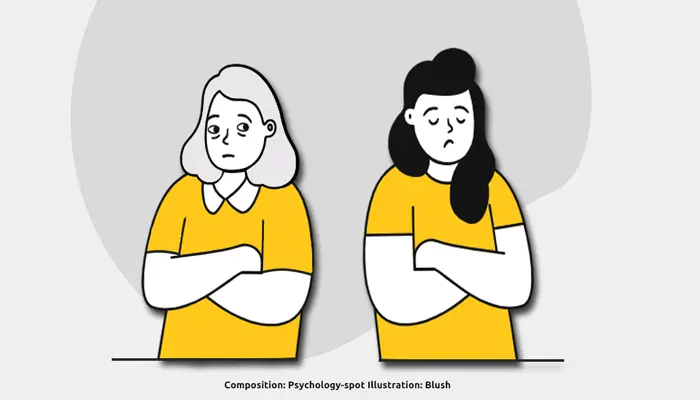
In an ideal world, parents would raise their children with unconditional love and adult children would treat their parents with respect, returning the love they received. But we don’t live in an ideal world and many relationships between parents and their children are far from that idyllic image.
No child comes with a parenting manual, so parents learn as they go, making mistakes and successes. And much of this trial and error process leaves emotional wounds that, if not healed, can later cloud the relationship.
The mismatch of narratives and the duality of experience
When parent-child relationships become strained, parents wonder why their children treat them badly. These situations can become disconcerting, to the point of feeling disoriented, not knowing what to do, enveloped in a wave of sadness and frustration.
However, it is crucial to understand that parents’ perspectives often do not match their children’s narratives. A parent may know they did the best they could, but for a high-demanding child, that attention, care and affection may not have been enough.
It is essential to recognize that each member of the family experiences and perceives the story differently. What is a clear example of sacrifice for a parent may not be so obvious for a child. What is an educational punishment for a parent may be a disproportionate and unjust action for a child.
Personal narrative is not built solely on facts, but also encompasses the experiences, expectations and needs of each person. For example, a father who worked long hours to give his son everything he needed may believe that his sacrifice was a sign of love. On the other hand, it is likely that the child longed for his presence and could even interpret it as disinterest or abandonment. In fact, emotional neglect in childhood creates unassertive adults.
These discrepancies in perception can lead to different narratives that fuel resentment and hostility in the relationship. For this reason, it is not unusual for parents’ memories to differ from those of their children, at least in interpretation.
Why does a child mistreat his mother or father? The 5 main causes
It is a scenario that few parents expect, but children who were once small, fragile and dependent can become distant, critical and, in some cases, even cruel. For many parents, this change is incomprehensible, but there may be deeper psychological causes behind this behavior. Detecting them is essential to begin the path towards reconciliation and family peace.
1. Criticism and disdain
Parents, often unwittingly and sometimes motivated by the best of intentions, adopt a very critical attitude towards their children or even underestimate their achievements. In fact, studies have found that parents constantly minimize children’s concerns, so it should not surprise them later when their adult children minimize theirs, since it is the relational pattern they have learned at home.
These attitudes can make children feel inadequate and undervalued. As they grow up, this feeling does not go away, but rather fuels feelings of helplessness, insecurity, resentment and anger, which they end up projecting onto their parents.
What can parents do? They can engage with their children through empathy, understanding, respect and positive reinforcement to foster a healthy relationship with their adult children. It’s about stopping seeing their children’s weaknesses so much and starting to recognize their strengths and abilities, so that they learn to value them for it.
2. Not recognizing that their children have grown up
As children grow older, parents may have difficulty adjusting to their new role and accepting that their children have become independent adults. This reluctance could be due to nostalgia, their natural instinct to protect them, but also to a latent desire to control and manipulate.
If parents try to continue controlling the lives of their adult children, many frictions and conflicts are likely to arise. And the worse thing is that, the more they try to control them, the less they respect their limits or the more they try to manipulate them, the more the children will distance themselves, and in the end they are doing nothing more than trying to defend their identity and independence.
What can parents do? They must accept the new roles that life brings and begin to develop a more equal relationship, in which mutual respect and recognition of the autonomy of adult children prevail. They must be supported, but without being invasive, and guided, but without imposing.
3. Have pending conflicts
Most parent-child relationships are not exactly a walk in the park. There are often latent conflicts that do not come to the surface but which generate emotional tension that marks each interaction. Generally, these disagreements are due to past events that generated wounds that have not healed and continue to fuel frustration and resentment.
These wounds are not always visible, but they are there, like small cracks that weaken the relationship over time. Perhaps it is an important promise that was broken, a lack of support at a crucial moment, or an emotionally violent episode. These unresolved conflicts end up permeating the discussions, causing the negative emotions that are at their base to surface.
What can parents do? The key is to unearth those old ghosts. Instead of pretending that nothing is happening, parents and children need to talk, with a genuine willingness to understand each other, not just defend their position. It may be a little uncomfortable, but only then can the wounds be cleaned and allowed to truly heal. Forgiveness and acceptance that both parties made mistakes are essential steps to rebuilding the relationship.
4. Look in very different directions
To complicate matters further, as children mature and develop their identities, they may embrace values or beliefs that conflict with those of their parents, which becomes an additional source of disagreement and tension within the family.
This clash of beliefs can fuel the fires of old conflicts, turning every conversation into a battleground where neither seems willing to give in. Poor communication patterns can exacerbate such problems, leading to misunderstandings and often leading to hurtful arguments.
What can parents do? The real challenge is to find common ground, however small it may be. It’s not about trying to get both parents to think the same, but about respecting each other’s point of view. You have to avoid ego fights, take a step back and rebuild those bridges so that differences don’t become walls that separate them.
5. Unrealistic expectations or constant demands
In other cases, the source of resentment and problems comes from parents putting too much pressure on their children, pushing them to meet impossible standards. These expectations, although well-intentioned, can become a heavy burden for children, especially if they do not feel capable of meeting them.
Sometimes parents project their own aspirations or frustrations onto their children, expecting them to achieve what they could not. This constant pressure can create a feeling of inadequacy in children, who feel that no matter what they do, it will never be enough.
Parents also expect their children to acknowledge their efforts and show gratitude in ways they deem acceptable, which can create a crushing sense of obligation. When these expectations are not openly communicated, frustration builds up and, over time, can fuel rebelliousness and rejection in children, leading to verbal attacks or dismissive behavior.
What can parents do? The first thing is to adjust unrealistic expectations. You have to recognize that every child has his or her own path and that his or her successes and achievements will not always coincide with parental expectations. The most important thing is to offer unconditional support, showing that your love and appreciation does not depend on what the child’s achievements are, but on who they are. In this way, you create a more relaxed environment in which children feel accepted and supported, so that they stop becoming defensive.
Of course, no parent is perfect, and it’s not always their fault that their children treat them poorly. Most parents tend to harbor a deep love and a genuine desire to connect with their children and want them well. They may just need to learn to listen more, putting aside their role as protector to take on their new role as companion in their children’s lives.




Leave a Reply